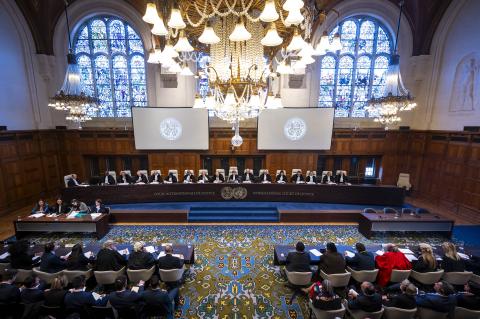
The ICJ delivering its order on the South Africa versus Israel case today.
The Hague: The International Court of Justice (ICJ) today ruled that “at least some of the acts and omissions” alleged by South Africa to have been committed by Israel in Gaza, fell within the provisions of the Genocide Convention.
Delivering its Order on the request for the indication of provisional measures submitted by South Africa in the case concerning the Application of the Convention on the Prevention and Punishment of the Crime of Genocide in the Gaza Strip (South Africa versus Israel), the 17-judge bench of the Court concluded that, prima facie, it had jurisdiction under Article IX of the Genocide Convention to entertain the case. Hence it refused to accede to Israel’s request that the case be removed from the General List.
The Court ruled that Israel must, per its obligations under the Genocide Convention, concerning Palestinians in Gaza, take all measures within its power to prevent the commission of all acts within the scope of Article II of this Convention, in particular: (a) killing members of the group; (b) causing serious bodily or mental harm to members of the group; (c) deliberately inflicting on the group conditions of life calculated to bring about its physical destruction in whole or in part; and (d) imposing measures intended to prevent births within the group.
The ICJ recalled that these acts fall within the scope of Article II of the Genocide Convention when they are committed with the intent to destroy in whole or in part a group. The Court further said that Israel must ensure with immediate effect that its military forces do not commit any of the above-described acts.
Reading out the order at the Peace Palace in The Hague, ICJ President Joan Donoghue ruled that Israel must take all measures within its power to prevent and punish the direct and public incitement to commit genocide in relation to members of the Palestinian group in the Gaza Strip.
It further asked Israel to take immediate and effective measures
- to enable the provision of urgently needed basic services and humanitarian assistance to address the adverse conditions of life faced by Palestinians in the Gaza Strip;
- to prevent the destruction and ensure the preservation of evidence related to allegations of acts within the scope of Article II and Article III of the Genocide Convention against members of the Palestinian group in the Gaza Strip.
The Court asked Israel to submit a report to the Court on all measures taken to give effect to its Order within one month from the date of the Order. The report so provided shall then be communicated to South Africa, which shall be allowed to submit its comments to the Court.
Meanwhile, the Court also deemed it necessary to emphasize that all parties to the conflict in the Gaza Strip were bound by international humanitarian law. It said it was “gravely” concerned about the fate of the hostages abducted during the attack on Israel on October 7, 2023, and held since then by Hamas and other armed groups, and called for their immediate and unconditional release.
The Court today began the proceedings by recalling that on December 29, 2023, South Africa filed an Application instituting proceedings against Israel concerning alleged violations by Israel of its obligations under the Convention on the Prevention and Punishment of the Crime of Genocide (the “Genocide Convention”) concerning Palestinians in the Gaza Strip.
Also read: Israel denies SA charges of genocide in Gaza at ICJ
In its Application, South Africa also requested the Court to indicate provisional measures to “protect against further, severe and irreparable harm to the rights of the Palestinian people under the Genocide Convention” and “to ensure Israel’s compliance with its obligations under the Genocide Convention not to engage in genocide, and to prevent and to punish genocide”
Public hearings on South Africa’s request for provisional measures were held on January 11 and 12, 2024.
– global bihari bureau





